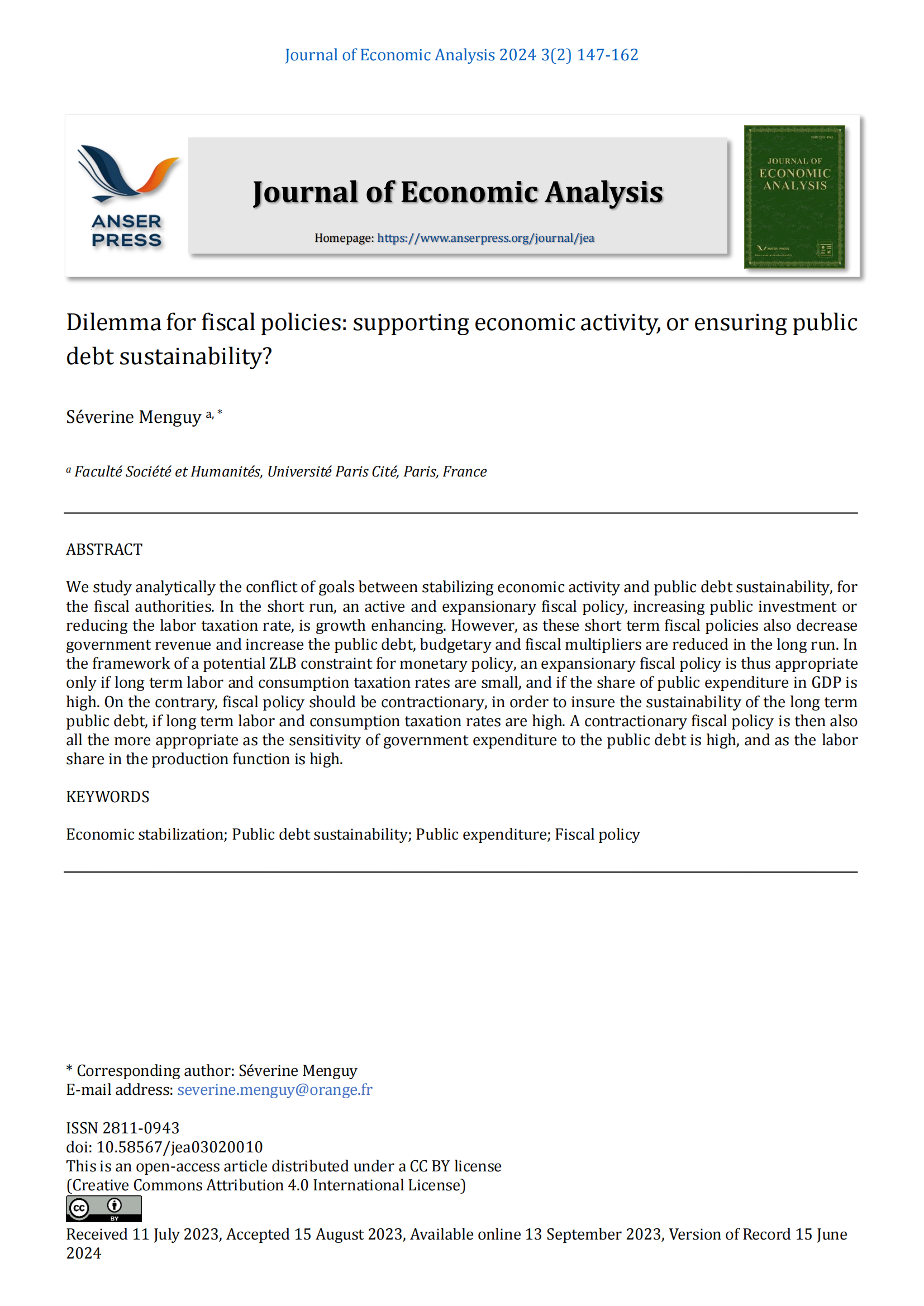Dilemma for fiscal policies: supporting economic activity, or ensuring public debt sustainability?
DOI:
https://doi.org/10.58567/jea03020010Keywords:
Economic stabilization; Public debt sustainability; Public expenditure; Fiscal policyAbstract
We study analytically the conflict of goals between stabilizing economic activity and public debt sustainability, for the fiscal authorities. In the short run, an active and expansionary fiscal policy, increasing public investment or reducing the labor taxation rate, is growth enhancing. However, as these short term fiscal policies also decrease government revenue and increase the public debt, budgetary and fiscal multipliers are reduced in the long run. In the framework of a potential ZLB constraint for monetary policy, an expansionary fiscal policy is thus appropriate only if long term labor and consumption taxation rates are small, and if the share of public expenditure in GDP is high. On the contrary, fiscal policy should be contractionary, in order to insure the sustainability of the long term public debt, if long term labor and consumption taxation rates are high. A contractionary fiscal policy is then also all the more appropriate as the sensitivity of government expenditure to the public debt is high, and as the labor share in the production function is high.
References
Andrés, J., Burriel, P., and Shi, W. (2020). Debt Sustainability and Fiscal Space in a Heterogeneous Monetary Union: Normal Times vs the Zero Lower Bound. Working Paper, n°2001, Banco de España. http://dx.doi.org/10.2139/ssrn.3521243
Battistini, N., Callegari, G., and Zavalloni, L. (2019). Dynamic Fiscal Limits and Monetary-Fiscal Policy Interactions. ECB Working Paper, n°2268, April. http://dx.doi.org/10.2139/ssrn.3374165
Bohn, H. (1998). The Behavior of U.S. Public Debt and Deficits. Quarterly Journal of Economics, 113 (3), 949–963. https://doi.org/10.1162/003355398555793
Bonam, D., and Lukkezen, J. (2019). Fiscal and Monetary Policy Coordination. Macroeconomic Stability, and Sovereign Risk Premia. Journal of Monetary, Credit and Banking, 51 (2-3), March-April, 581–616. https://doi.org/10.1111/jmcb.12577
Burriel, P., Checherita-Westphal, C., Jacquinot, P., Schön, M., and Stähler, N. (2020). Economic Consequences of High Public Debt: Evidence from three Large Scale DSGE Models. European Central Bank, Working Paper Series, n°2450, July. https://EconPapers.repec.org/RePEc:bde:wpaper:2029.
Carvalho, V. M., and Martins, M. M. F. (2011). Macroeconomic Effects of Fiscal Consolidations in a DSGE Model for the Euro Area: Does Composition matter? FEP Working Papers, n°421, Universidade do Porto, Facultade de Economia do Porto. https://EconPapers.repec.org/RePEc:por:fepwps:421
Checherita-Westphal, C., and Zdarek, V. (2017). Fiscal Reaction Function and Fiscal Fatigue: Evidence for the Euro Area. ECB Working Paper, n°2036, March. https://EconPapers.repec.org/RePEc:ecb:ecbwps:20172036
Corsetti, G., Kuester, K., Meier, A. and Mûller, G. J. (2013). Sovereign Risk, Fiscal Policy, and Macroeconomic Stability. Economic Journal, 123, F99–F132. https://EconPapers.repec.org/RePEc:ecj:econjl:v::y:2013:i::p:f99-f132
European Commission (2022). Taxation Trends in the European Union: Data for the EU Member States, Iceland, Norway. Publications Office of the European Union. https://data.europa.eu/doi/10.2778/417176
Finn, M. G. (1998). Cyclical Effects of Government’s Employment and Goods Purchases. International Economic Review, 39 (3), August, 635–657. https://doi.org/10.2307/2527394
Larch, M., Orseau, E., and Van der Wielen, W. (2021). Do EU Fiscal Rules support or hinder Counter-cyclical Fiscal Policy? Journal of International Money and Finance, 112, April, 102328.
https://doi.org/10.1016/j.jimonfin.2020.102328
Linnemann, L., and Schabert, A. (2010). Debt Non-neutrality, Policy Interactions, and Macroeconomic Stability. International Economic Review, 51 (2), May, 461–74. https://doi.org/10.1111/j.1468-2354.2010.00588.x
Martin, P., Pisani-Ferry, J., and Ragot, X. (2021). Reforming the European fiscal framework. Les notes du conseil d’analyse économique, n°63, Conseil d'Analyse Économique, April. https://www.cae-eco.fr/staticfiles/pdf/cae-note063-en.pdf
Nerlich, C., and Reuter, W. H. (2015). Fiscal Rules, Fiscal Space and Procyclical Fiscal Policy. ECB Working Paper, n°1872, December. http://dx.doi.org/10.2139/ssrn.3409786
Sims, E., and Wolff, J. (2018). The Output and Welfare Effects of Government Spending Shocks over the Business Cycle. International Economic Review, 59 (3), August, 1403-1435. https://doi.org/10.1111/iere.12308

Downloads
Published
How to Cite
Issue
Section
License
Copyright (c) 2023 Séverine Menguy

This work is licensed under a Creative Commons Attribution 4.0 International License.



